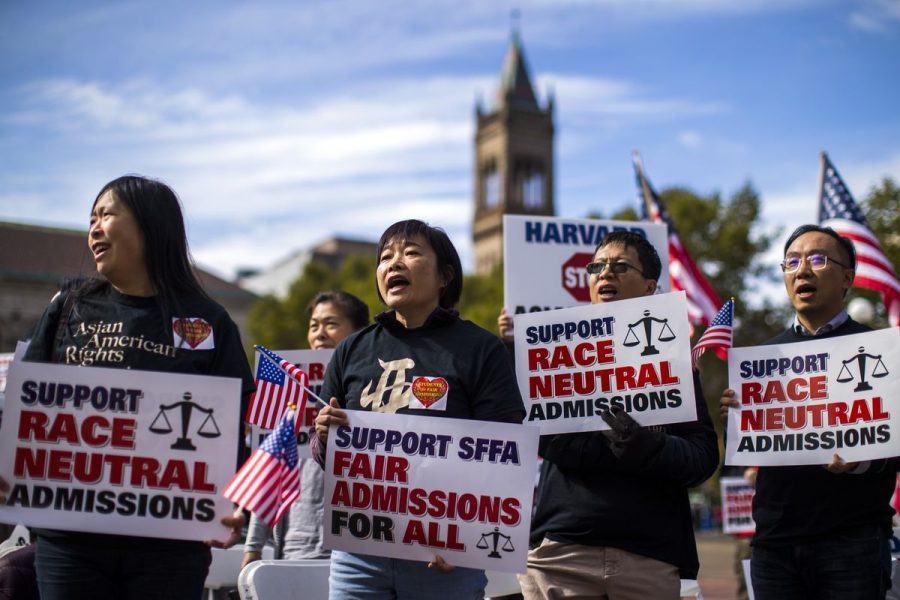When Will Racial Preferences in College Admissions End?
Students for Fair Admissions (SFFA) is set to begin arguing against Harvard and UNC’s affirmative action policies before the Supreme Court on Oct. 31.
September 28, 2022
Beginning Oct. 31, the Supreme Court will begin to hear arguments from Students for Fair Admissions v. President and Fellows of Harvard College. Students for Fair Admissions (SFFA), a non-profit comprising more than 20,000 students, is suing Harvard and the University of North Carolina at Chapel Hill (UNC) on allegations that they have violated Title VI of the Civil Rights Act of 1964 by considering race as a factor in admissions.
Title VI of the US Constitution reads that “No person in the United States shall, on the ground of race, color, or national origin, be excluded from participation in, be denied the benefits of, or be subjected to discrimination under any program or activity receiving Federal financial assistance.”
Harvard and UNC are subject to Title VI because they both receive federal funds. However, the consideration of race as a factor in college admissions has been considered legal for decades, according to court precedent.
A key question in the case that SFFA is rightly proposing to the Supreme Court is whether or not Grutter v. Bollinger should be overturned. Grutter v. Bollinger is a 2003 case which established the precedent that admissions decisions involving race are legal under the equal protection clause of the 14th Amendment so long as race is not used as the sole deciding factor.
SFFA is also asking why UNC’s admission policies are not considered obvious violations of Title VI and how Harvard’s racial preferences are not a violation of the ban on racial quotas in university admissions (made illegal in the 1973 case Regents of the University of California v. Bakke).
The data from admission files at Harvard showing that the university desires to achieve a particular racial makeup is extremely compelling. From 2014 to 2019, compared to other racial groups, Asian-American applicants to Harvard had significantly higher average ratings for test scores, grades and extracurricular activities. Yet they ranked among the bottom for their personal score, which is intended to evaluate soft qualities such as kindness, humor or respect. SFFA’s analysis showed that even though Asian American students were the most qualified applicants, they had the lowest chance of admission of any racial group. Duke Economics Professor Peter Arcidiacono has testified that according to the admission data, should an Asian applicant have the test scores, scores and extracurricular activities that would give them a 25% chance of admission, a Black applicant with the same qualifications would have a 95% chance of admission.
Arcidiacono also found through evaluation of nearly 60,000 UNC applicants, in-state Black applicants were 33 times more likely to be admitted than in-state Asian applicants of comparable qualifications. Out-of-state Black applicants were 10 times more likely to be admitted than similarly situated whites. Such admission benefits were also shown in Hispanic students compared to Asian and white students. In violation of Title VI, UNC has admitted to recruiting low-income and first-generation students as a means to achieve “adequate” racial representation.
SFFA is not only right to argue that race preferences in admissions are illegal, but that they are also impractical. Race-conscious admission policies are not only unfair to deserving and qualified students that are denied admission due to their race, but they also tend to hurt minority groups by placing less-qualified students among a more-competitive admitted class merely to fit racial quotas.
After the elimination of racial preferences at UCLA in 1998, while the number of Black and Hispanic students fell on campus in the following years, the number of them ultimately graduating remained the same. This was possible because UCLA was admitting better-matched Black and Hispanic applicants than their previous counterparts who had lower qualifications but still got in due to racial preference.
Moreover, doing away with racial preference does not have to mean doing away with the recruitment of a diverse student body. Universities should still be selecting students who bring a variety of different ideas and experiences to contribute to an intellectually-robust university environment.
The majority of Americans agree with the concerns that SFFA brings to the court. According to a Pew Research Survey conducted in 2019, 73% of Americans believe race should not be considered when universities make admissions decisions.
The Supreme Court is also in a prime position to overturn Grutter v. Bollinger. While newly appointed Judges Neil Gorsuch (appointed 2017), Brett Kavanaugh (2018) and Amy Coney Barett (2020) have never ruled on cases involving affirmative action, it would be difficult to imagine them siding with precedent, given the judicial views each of them bring to the court. Gorsuch is a strict constitutionalist, Kavanaugh assisted the Bush administration in their stance against the use of affirmative action at the University of Michigan, and Barrett attributes much of her inspiration to justices that have previously voted against upholding race-conscious admission practices.
After SFFA begins to present its case at the end of October, the court will continue to hear arguments in the following months. A failure for the court to side with SFFA in early 2023 would continue to fuel the hyper-focus on race in higher education and lead to more missed opportunities for thousands of perfectly qualified applicants whose talent is being turned away in the name of racial diversity.


